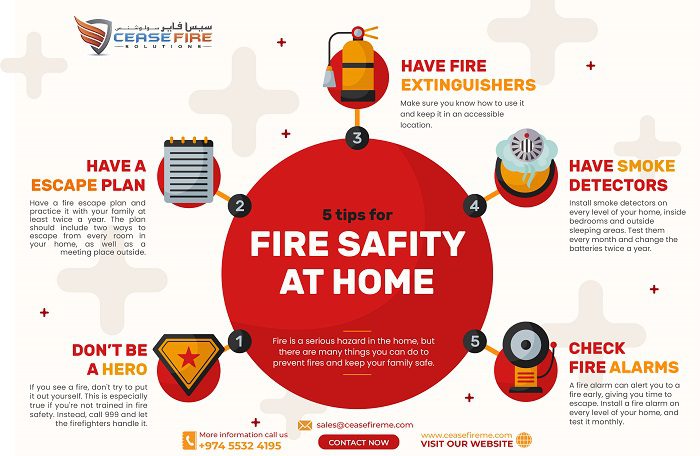5 Fire Safety Tips to Keep Your Home Safe

The Benefits of Clean Agent Fire Suppression Systems in Qatar: Keeping Your Property and Employees Safe
July 22, 2023
How to Properly Use a Fire Extinguisher: A Step-by-Step Guide
July 30, 2023Fires can happen anywhere, but they are especially dangerous in the home. According to the National Fire Protection Association, there are an average of 358,300 home fires each year worldwide. These fires cause an average of 2,660 deaths, 15,000 injuries, and $22 billion in property damage.
The good news is that most home fires can be prevented. By following a few simple fire safety tips, you can help keep your home and family safe from fire.
In this article, we will discuss some of the most important fire safety tips. We will cover everything from having a fire escape plan to knowing how to use a fire extinguisher. By following these tips, you can help make your home a safer place for you and your family.
5 Fire Safety Tips to Keep Your Home Safe
There are many things you can do to prevent a fire in your home. Here are 5 fire safety tips:
1. Don’t be a hero
If you see a fire, don’t try to put it out yourself if you’re not trained to do so. It’s better to get out of the building and call 911.
This is an important tip because trying to put out a fire yourself can be dangerous. You could get burned or injured, and you could also make the fire worse. It’s always best to leave the fire to the professionals.
2. Have a fire escape plan
Everyone in your household should know two ways out of every room and where to meet outside in case of a fire. Practice your escape plan at least twice a year.
Having a fire escape plan is essential for staying safe in the event of a fire. It’s important to know all of the exits in your home and where to meet outside in case of a fire. You should also practice your escape plan regularly so that you know what to do in an emergency.
3. Have smoke detectors
Smoke detectors and carbon monoxide detectors are essential for early warning of a fire or carbon monoxide leak. Install smoke detectors on every level of your home, including inside bedrooms and outside sleeping areas. Carbon monoxide detectors should be installed near bedrooms and in areas where fuel-burning appliances are used. Test smoke alarms and carbon monoxide detectors monthly and replace the batteries every year.
Smoke detectors can give you early warning of a fire or carbon monoxide leak, which can give you time to escape safely. It’s important to test your smoke detectors and carbon monoxide detectors monthly and replace the batteries every year to make sure they are working properly.
4. Be aware of fire hazards
There are many potential fire hazards in the home, such as cooking appliances, candles, space heaters, and electrical cords. Be careful when using these items and make sure they are properly maintained.
It’s important to be aware of the potential fire hazards in your home so that you can take steps to prevent them. For example, you should never leave cooking unattended, you should keep candles away from flammable materials, and you should make sure that electrical cords are not damaged.
5. Have a fire extinguisher in your home and know how to use it
A fire extinguisher can be a lifesaver if you catch a fire early. Make sure you know how to use it and that it’s in good working order.
It’s a good idea to have a fire extinguisher in your home in case of a small fire. Make sure you know how to use it and that it’s in good working order.
In conclusion, fires can be devastating, but they can be prevented. By following the fire safety tips in this article, you can help keep your home and family safe from fire. These tips include having a fire escape plan, having smoke detectors and carbon monoxide detectors, being aware of fire hazards, and keeping flammable materials away from heat sources. You should also teach children about fire safety at an early age. By following these tips, you can help make your home a safer place for you and your family.

